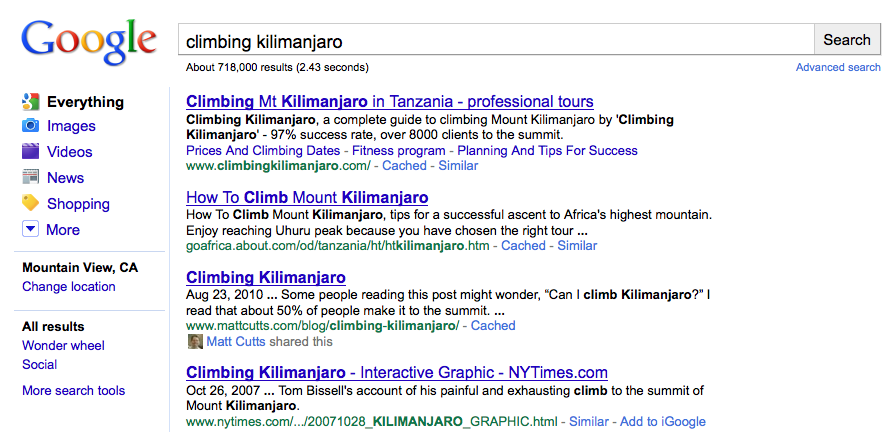New focus for Google Social
Monday, February 21st, 2011
Google announced last week that it was no longer relegating its so-called “Social Search” results to the bottom of Google search pages. Such results have been “lost” there since the feature was introduced in 2009. The results from users’ social graphs (to use a Facebook term) will now be integrated with standard search results (including those displayed with Google Instant) based on their relevance to user queries.
According to a post on Google’s corporate blog:
First, social search results will now be mixed throughout your results based on their relevance (in the past they only appeared at the bottom). This means you’ll start seeing more from people like co-workers and friends, with annotations below the results they’ve shared or created. So if you’re thinking about climbing Mt. Kilimanjaro and your colleague Matt has written a blog post about his own experience, then we’ll bump up that post with a note and a picture [click the image to see it full-sized]:
This sort of result requires that “friends” either link their social media to their Google profiles or share media directly via the profiles (for example, via Google Buzz). However, social media shared publicly by your friends will also now appear in search results:
For example, if you’re looking for a video of President Obama on “The Daily Show” and your friend Nundu tweeted the video, that result might show up higher in your results and you’ll see a note with a picture of Nundu…
Perhaps the most useful enhancement to the social search results, though, comes through easier, more private linking of social media accounts with either your Google profile or your Google account:
You can still connect accounts publicly on your Google profile, but now we’ve added a new option to connect accounts privately in your Google Account. (After all, you may not want everyone to know you’re @spongebobsuperfan on Twitter.) In addition, if our algorithms find a public account that might be yours (for example, because the usernames are the same), we may invite you to connect your accounts right on the search results page and in your Google Account settings.
This is all well and good, but what’s the takeaway? Google has struggled to come up with any sort of reasonably competitive answer to Facebook. It just hasn’t happened. Google’s strength, however, has always been search and managing the countless bits of data on the Web through complex algorithms. One has to ask, in fact, if Google even needs its own social platform if it can instead just index and make more useful all of the other social platforms that already exist. Time will tell…


